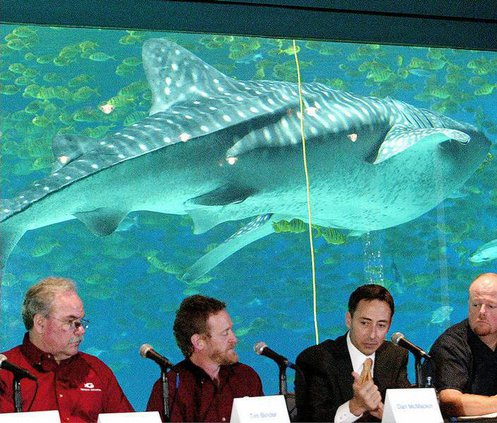ATLANTA — The January death of a whale shark at the Georgia Aquarium was likely caused by stomach problems that led to peritonitis, officials said Wednesday.
The aquarium released results of a necropsy from the University of Georgia College of Veterinary Medicine on Ralph, a whale shark that died on Jan. 11.
In a statement, aquarium executive director Jeff Swanagan said the whale shark’s stomach ‘‘appeared abnormal, because it was thin-walled and perforated. This likely caused peritonitis, which led to Ralph’s death.’’ He said physical examinations of the aquarium’s other male whale shark, Norton, have not revealed the same condition.
Peritonitis is an inflammation of an important membrane in the abdomen.
Swanagan said Ralph began losing his appetite last year after a series of treatments was prescribed to the Ocean Voyager exhibit to suppress a parasitic leech commonly found on aquatic animals.
After several treatments, he said, the appetites of Ralph and Norton declined, and they eventually stopped eating.
Alice and Trixie, the Aquarium’s two female whale sharks, were not exposed to the same number of treatments and have not shown the same behavior.
Swanagan said the whale sharks were given therapeutic food, fluids and medicine, their water was monitored and the method of treating the leeches was changed.
‘‘There is no evidence that anything in the Ocean Voyager’s environment led to Ralph’s death,’’ Swanagan said in the statement.
Ray Davis, senior vice president of zoological operations, said the necropsy did not show whether the parasite treatment played a role.
‘‘It’s inconclusive,’’ he said. The treatment was changed ‘‘on the side of caution’’ he said.
He said Norton, the other male whale shark, continues to have a diminished appetite.
‘‘Were still working with him on that,’’ Davis said.
Ralph’s death marked the second death of a popular exhibit at the aquarium in a 10-day span. Gasper, one of the Georgia Aquarium’s five beluga whales, was euthanized Jan. 2 after months of declining health.
Officials said the whale shark stopped swimming one afternoon and died later that night. The aquarium staff moved the 22-foot shark to another part of the tank after he stopped swimming and tried unsuccessfully to revive him.
Ralph and Norton arrived in June 2005 from Taipei, Taiwan, where they had been destined to become seafood. They were joined a year later by the two females, Alice and Trixie.
They are the only whale sharks on display outside of Asia.
Whale sharks are the world’s largest fish, growing more than 50 feet long.
———
On the Net:
Georgia Aquarium, http://www.georgiaaquarium.org
The aquarium released results of a necropsy from the University of Georgia College of Veterinary Medicine on Ralph, a whale shark that died on Jan. 11.
In a statement, aquarium executive director Jeff Swanagan said the whale shark’s stomach ‘‘appeared abnormal, because it was thin-walled and perforated. This likely caused peritonitis, which led to Ralph’s death.’’ He said physical examinations of the aquarium’s other male whale shark, Norton, have not revealed the same condition.
Peritonitis is an inflammation of an important membrane in the abdomen.
Swanagan said Ralph began losing his appetite last year after a series of treatments was prescribed to the Ocean Voyager exhibit to suppress a parasitic leech commonly found on aquatic animals.
After several treatments, he said, the appetites of Ralph and Norton declined, and they eventually stopped eating.
Alice and Trixie, the Aquarium’s two female whale sharks, were not exposed to the same number of treatments and have not shown the same behavior.
Swanagan said the whale sharks were given therapeutic food, fluids and medicine, their water was monitored and the method of treating the leeches was changed.
‘‘There is no evidence that anything in the Ocean Voyager’s environment led to Ralph’s death,’’ Swanagan said in the statement.
Ray Davis, senior vice president of zoological operations, said the necropsy did not show whether the parasite treatment played a role.
‘‘It’s inconclusive,’’ he said. The treatment was changed ‘‘on the side of caution’’ he said.
He said Norton, the other male whale shark, continues to have a diminished appetite.
‘‘Were still working with him on that,’’ Davis said.
Ralph’s death marked the second death of a popular exhibit at the aquarium in a 10-day span. Gasper, one of the Georgia Aquarium’s five beluga whales, was euthanized Jan. 2 after months of declining health.
Officials said the whale shark stopped swimming one afternoon and died later that night. The aquarium staff moved the 22-foot shark to another part of the tank after he stopped swimming and tried unsuccessfully to revive him.
Ralph and Norton arrived in June 2005 from Taipei, Taiwan, where they had been destined to become seafood. They were joined a year later by the two females, Alice and Trixie.
They are the only whale sharks on display outside of Asia.
Whale sharks are the world’s largest fish, growing more than 50 feet long.
———
On the Net:
Georgia Aquarium, http://www.georgiaaquarium.org

